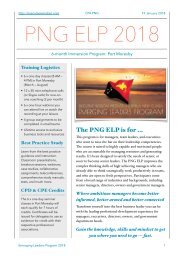Management Resources Guide
the 2018 Management Resources Guide details comprehensive information on the professional services provided by Executive Wisdom Consulting Group.
the 2018 Management Resources Guide details comprehensive information on the professional services provided by Executive Wisdom Consulting Group.
You also want an ePaper? Increase the reach of your titles
YUMPU automatically turns print PDFs into web optimized ePapers that Google loves.
Leadership & <strong>Management</strong> Training<br />
Critical Decision Making<br />
How to Effect Better, Successful Decisions in<br />
Companies, Organisations, and Teams<br />
All programs are designed, written and produced to your organisation’s specific requirements.<br />
What You Will Learn<br />
Why did that leader make such a horrible decision? We have all asked that question when we<br />
have observed a poor decision, whether it be in politics, business, athletics, or the non-profit<br />
sector. Too often, observers attribute such flawed choices to incompetence, inexperience, a lack<br />
of intelligence, or bad intentions. In most cases, though, the wrong decisions do not arise<br />
because of these factors.<br />
In this course, we examine why leaders and organisations make poor choices, digging deep into<br />
cognitive psychology, group dynamics, and theories of organisational culture and systems to<br />
help us understand why well-intentioned, capable people blunder. Moreover, we examine the<br />
techniques and behaviours that leaders can employ to improve decision making in their<br />
organisation. We focus on how leaders can design decision-making processes that marshal the<br />
collective intellect in their organisations, bringing together the diverse expertise, perspectives,<br />
and talents to determine the best course of action.<br />
The course uses case studies to examine decision making at three levels: individual, group, and<br />
organisational. We examine how individuals make choices. We show that most individuals do<br />
not examine every possible alternative or collect enough information and data when making<br />
choices. Instead, most of us draw on our experience, apply rules of thumb, and use other<br />
heuristics when making decisions. As it turns out, most individuals are susceptible to what<br />
psychologists call cognitive biases—decision traps that cause us to make certain systematic<br />
mistakes when making choices.<br />
Every one of our training programs is uniquely designed and tailored to meet your specific<br />
circumstances and objectives.<br />
Topic Menu includes but is not limited to:<br />
Making High-Stakes Decisions.<br />
Cognitive Biases.<br />
Avoiding Decision-Making Traps.<br />
Framing—Risk or Opportunity?<br />
Intuition—Recognising Patterns.<br />
Reasoning by Analogy.<br />
Making Sense of Ambiguous Situations.<br />
The Wisdom of Crowds?<br />
Groupthink—Thinking or Conforming?<br />
Deciding How to Decide.<br />
Stimulating Conflict and Debate.<br />
Keeping Conflict Constructive.<br />
Creativity and Brainstorming.<br />
The Curious Inability to Decide.<br />
Achieving Closure through Small Wins.<br />
Normal Accident Theory.<br />
Normalising Deviance.<br />
Three Lenses.<br />
Practical Drift.<br />
Ambiguous Threats and the Recovery<br />
Window.<br />
Connecting the Dots.<br />
Seeking Out Problems.<br />
Asking the Right Questions.<br />
30



